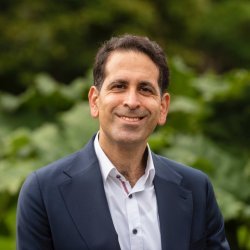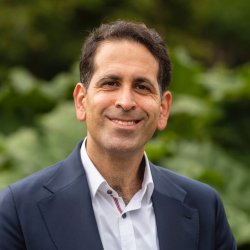Meet the academic: Professor Roi Cohen Kadosh
Professor Roi Cohen Kadosh, Head of the School of Psychology and Professor of Cognitive Neuroscience, shares how he became fascinated with neuroscience, why you should study psychology and what he’s looking for in a student.

Please could you introduce yourself?
I am a cognitive neuroscientist, which means that I am interested in the link between the ability to thinking and learning and the brain. I am trying to understand how our thinking is influenced by our brain and to develop methods to improve our thinking and learning in patients and healthy individuals.
I started my studies in Israel on a programme that is similar to our Foundation Year because my A-levels were not good enough for university. I worked very hard during my undergraduate and was lucky that I had great teachers who supported me, which meant that I was able to produce a multiple experiment paper that was submitted to one of the flagship journals in psychology already during my BSc.
Why did you become a psychologist?
When I was 13, I found out that my mother had schizophrenia and had received treatment for many years. After relapsing, the illness affected her really badly and she took her own life a year later. She was only 36 years old, and it was my most difficult period in my life.
I tried to learn everything I could about schizophrenia, and mental health more generally, and became fascinated by the topic of psychology with the ambition to help other people.
How did you become a psychologist?
I did not have very good A-level grades, so I started studying on a programme that is comparable to the foundation year course here at Surrey. I worked my socks off and surprisingly got high grades which resulted in a prestigious full PhD fellowship for 4 years that is targeted at masters students, not undergraduates. I was jumping up and down remembering that at the beginning I did not even imagine I would be accepted to the MSc programme.
Once you qualified, where did your career take you and were there any highlight moments?
I moved to University College London to complete my postdoctoral degree and afterwards to Oxford to build my own lab. It came as a bit of a shock that when my very productive postdoctoral period (where I published 27 papers) had come to an end, I could not find any job as a postdoctoral researcher or a lecturer! We were expecting our first baby and I felt so bad getting those rejections from posts that, in a hindsight, I was overqualified for. I became unemployed for the first time in my life. And then, I got lucky and received three job offers in excellent places, and I chose to move to Oxford. Six years later I became a full professor.
How and why did you become an academic?
I want to change the world, generate new knowledge and get closer to the truth. I also feel privileged that I get to help shape the next generation of psychologists (and at the same time learning from them), who will also change the world, each in their own way.
What excites you most about your current role?
The ability to support others in their careers to fulfil their goals in research and/or teaching. To provide people with opportunities to flourish and become even better than they are. It has much more impact than focusing solely on my own research (and I love my research).
What is your specific area of expertise, and why are you passionate about it?
I am interested in understanding how we can predict learning and thinking from childhood to adulthood and based on that, how we can improve such mental processes. A main tool I am using is non-invasive, painless, brain stimulation. I am passionate about that, as successful research here could tell us how we could become smarter and better learners, with implications to a variety of users from children with atypical development, to healthy individuals, to those who experience difficulties due to ageing.
Why should people study psychology?
The comprehensive work that psychologists, especially at Surrey, are doing spans from studying brain function, to social interactions and health and nutrition, from clinical interventions to how we interact with the environment. Psychology gives us excellent tools to change the world, and it is well placed to interact with other fields from medicine to social sciences, engineering and computer sciences.
What are you looking for in a psychology student?
- Be willing to work hard. There are no shortcuts in life. If a student is passionate, puts their heart and soul into the degree, they will see how much they could benefit from their studies.
- Recognise an opportunity and don’t miss it. Not everyone can go to university, and if you are here, do the best to benefit from this experience, academically and socially.
- Be a problem solver. It is easy to run to the lecturers to ask for their help but try to be independent and solve problems yourself. It will be a great skill that will help you now and in your future career.
Is there a specific memory of your time at Surrey (so far) which stands out for you?
Welcoming the first undergraduate students and the Foundation Year students. I was standing there talking to them and thought to myself: “I was there 20 years ago; it would be wonderful if one or more of them will do the same thing in 20 years from now.”
